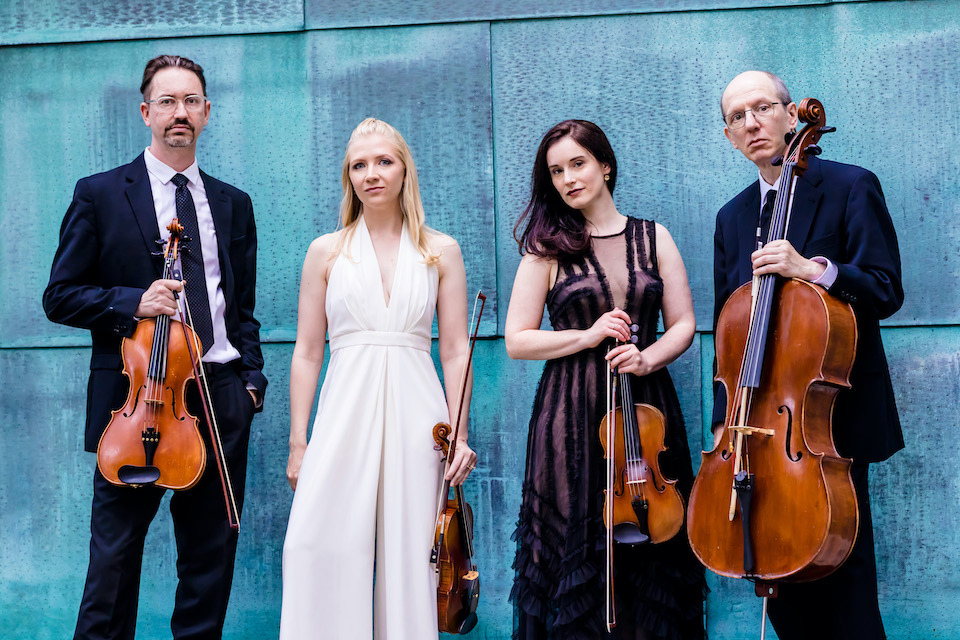New violinist for Lydian String Quartet
March 21, 2023

The Lydian String Quartet (Mark Berger, Julia Glenn, Andrea Segar, Joshua Gordon). | Photo Credit: Christopher Huang
by Phil Radoff and Jack Curley
It was just over a year ago that we reported on the imminent retirement of the Lydian String Quartet’s Second Violinist, Judy Eissenberg. Judy has now been replaced by Julia Glenn, who returns to the Boston area from an extended stay in China, where she has been a member of the faculty at the Tianjin Juilliard school and a member of the Tianjin Julliard Ensemble. Julia has been named an associate professor of the practice in the Brandeis Music Department with teaching as well as performance responsibilities.
We recently sat down with Julia (all appropriately masked) in the Lydians’ rehearsal room in Slosberg Music Center to ask about her thoughts on leaving China and joining the Quartet.
The decision to leave China, where Julia had been living, teaching, and concertizing for the past three years, was not an easy one, but the opportunity to join the Lydians and to be closer to her family proved to be irresistible. Having grown up in Wellesley, the daughter of musical parents (her mother, Bayla Keyes, was a member of the Muir String Quartet), and having attended New England Conservatory as well as Harvard University, Julia was well acquainted with Brandeis’s world-renowned quartet-in-residence. When she learned of the position opening she quickly submitted a sampling of recordings of her past performances and soon was invited to come to Waltham for an extensive series of auditions with the members of the Quartet. It became clear to all in short order that Julia would be an ideal fit for the vacant Second Violin position.
Julia was particularly attracted by the group’s embrace of new music by American and international composers. Since her arrival, she has been grateful for the “openness and generosity” shown to her by fellow members, with whom she quickly felt the formation of an “incredible musical bond” as she settled comfortably into the Second Violin role. She adds that, despite having played together for several years, the other members of the quartet were open to her ideas even as to works that the group had played many times in past years.
Julia observes that during the 20th and especially 21st century, the role of second violinist is often more varied than in traditional 18th and 19th century repertoire. In all cases, however, each player is essential to the “full life” of the ensemble experience. Julia sees her objective as providing the ensemble with a collaborative “inner voice” of equal importance to each of the other parts.
Julia’s interest in China dates from her participation as a high schooler in Benjamin Zander’s New England Conservatory Youth Philharmonic Orchestra, which embarked on a lengthy tour of that country in 2007. After her return she began extensive studies in Chinese language, music, and phonology as an undergraduate at Harvard, which led to a doctoral dissertation at Juilliard on contemporary Chinese music. She hopes one day to develop an interdisciplinary course at Brandeis, blending works by Chinese authors, artists and composers.
While she will miss her many Chinese colleagues and friends, Julia welcomes the return to her Boston-area roots, which means proximity to much of her family. Although her husband is currently in Germany on a temporary work assignment, her mother, father and other family members remain in the area.
Julia lists among her favorite composers Béla Bartók in the 20th century and French composers like Lully, Couperin, and Rameau of the Baroque era. Of the many concert halls in which she has performed around the world, her fondest memories are of appearances at Beijing Concert Hall, Beijing’s National Center for the Performing Arts and, perhaps surprisingly, New York City’s Le Poisson Rouge, a concert venue and bar for avant-garde performances.
This spring Julia will release “The Road” a CD of music by contemporary Chinese and Chinese-speaking composers. She will appear with the other members of the Quartet in an upcoming concert at Slosberg on March 25, featuring music by Benjamin Britten and Fanny Mendelssohn and the world premiere of a work by Lydian competition prize-winner Ricardo Zohn-Muldoon.
Additional information about Julia’s new CD and her upcoming performances, and links to some of her noteworthy past performances, are available at her website. Her performance video of the Brahms String Sextet No. 2 bears a dedication to the memory of renowned musician and music professor, Roger Tapping, former violist with the Juilliard Quartet, who was influential, both personally and professionally, in Julia's life.
In parting, Julia expressed her gratitude to the Lydians and to Brandeis for the opportunity she has been given to return to her Massachusetts roots in an academic environment that affords such creativity and openness.